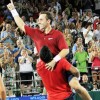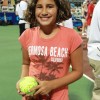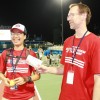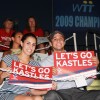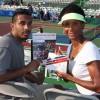By Christopher Lancette
The Washington Kastles fend off five match points in a super tiebreaker against the New York Sportimes at a recent World Team Tennis match in their jam packed riverfront stadium. The Kastles pull even at 6-6 and the next point is winner take all. Bobby Reynolds cracks a 124 mile-per-hour serve that draws a defensive reply from New York – giving cougar-quick partner Leander Paes the chance to slam an overhead past John McEnroe for the winner.
The crowd goes nuts. Paes lifts Reynolds in the air. Coach Murphy Jensen does a Lambeau leap into the seats.
Eleven-year-old Deena Elrefai loves it. She just witnessed her first pro tennis match, racing out on to the court after the victory and snagging autographs.
“The best part was when the Kastles hit that awesome spike and ended the match,” she says, her brown eyes beaming as she holds up a grapefruit-sized tennis ball full of fresh signatures. She promptly pronounces that Reynolds is her favorite player. “I thought that was so cool.”
Elrefai is far from the only person at the wharf who’s new to team tennis, a nine-team league playing in cities spanning from Sacramento to Boston. The game hooks all kinds of new fans on this night – people like Jeff Buoy, whose voice is a little horse after the dramatic finale.
“You can make noise at World Team Tennis” he shouts. “This is not Wimbledon, where you have to be quiet or they kick you out. That’s huge. This is really well done. I didn’t think it was going to be set up like this.” He and wife En-chi Lin are attending only their second match and affirm they want more tennis in their lives.
“I think it’s really exciting,” Lin says. “It’s not just about the sets you win but the total games. You also get to see a lot of players at once. It’s very efficient. You come out for three hours and see about 10 different players.”
Fans are still buzzing all over the venue while McEnroe is standing on the side of the court contradicting himself.
He said before the match that World Team Tennis is about providing entertainment for the fans and that it deserves a place on the calendar for that reason. He promptly dispatched that gentle façade about 60 seconds after unzipping his tennis bag, getting caught up in the heat of a steamy Washington night that got competitive in a flash.
Losing still disgusts him.
“It hurts when you get old and gray, especially when you taste a win and had it on your racquet,” he says. “The other guys on the on the team got us in position to win.
If it’s about just entertainment, why not phone it in?
“That’s not in my vocabulary,” he says. “I get on a court, I get pumped up. Guys are pulling for you. Everyone gets their money’s worth.”
Martina Hingis didn’t make any calls, either.
“These matches bring out the competitiveness,” the former world No. 1 says. “It’s a challenge out there. A match going back and forth like this, it’s great for the fans. This is all about rooting for your team.”
No pro wants to lose and fans, even newbies, love seeing them slug it out.
Count Avrielle Suleiman among that number.
“I like that the players get really excited,” the first-timer says. “I liked the doubles. Leander was so close to the ball and I felt like it was going to hit him, but he gets it. It’s nerve-racking but in a good kind of way.”
Everton Batista couldn’t agree more.
“This is a different kind of exciting than most sports,” he opines. “It’s more about precision and accuracy. And it’s really neat to see male and female players and different ages playing together.”
Different ages and genders attend matches together, too. Adriene Jordan brought her son Thomas Jordan. She’s an active USTA player who’s now on her first team tennis squad. The younger Jordan is a Tufts University student who didn’t seem overly optimistic he’d care for the match before the event started.
He had a different view by half time.
“It’s pretty entertaining,” he admits. “The doubles was pretty intense, especially the mixed. This is another sporting event I find myself getting into. I’ll come back.”
The match is over but adrenalin is still racing around Kastles Stadium. Jensen is letting his emotions fly.
“This was a magical match for the fans and a magical night for me,” he says. “This may be the best atmosphere I’ve ever seen.”
It’s also a night that’s doing more for tennis than anyone can imagine. Young Deena Elrefai is still wandering around the court taking it all in, the cement just beginning to set on memories that will last a lifetime. Elrefai doesn’t want to go home but she has made a big decision that gives her comfort.
“I think I really want to start playing tennis,” she declares. “I think it could be really fun sport to play.”
Billie Jean King’s face lights up as she finds out about Elrefai’s experience a few days later when the tennis pioneer and Word Team Tennis founder visits the same stadium.
“That makes me feel like we’re doing what we’re supposed to be doing,” King says in answer to a question from World Tennis Magazine. “It’s fantastic. One thing we’re trying to do with World Team Tennis is grow the sport. Any time you can give the gift of tennis to anyone, particularly a child, it’s a gift of a lifetime.”
WTM contributor Christopher Lancette writes about life in Washington D.C. for a variety of publications and for his DC Reflections blog.
Photo credit © by Won-ok Kim

